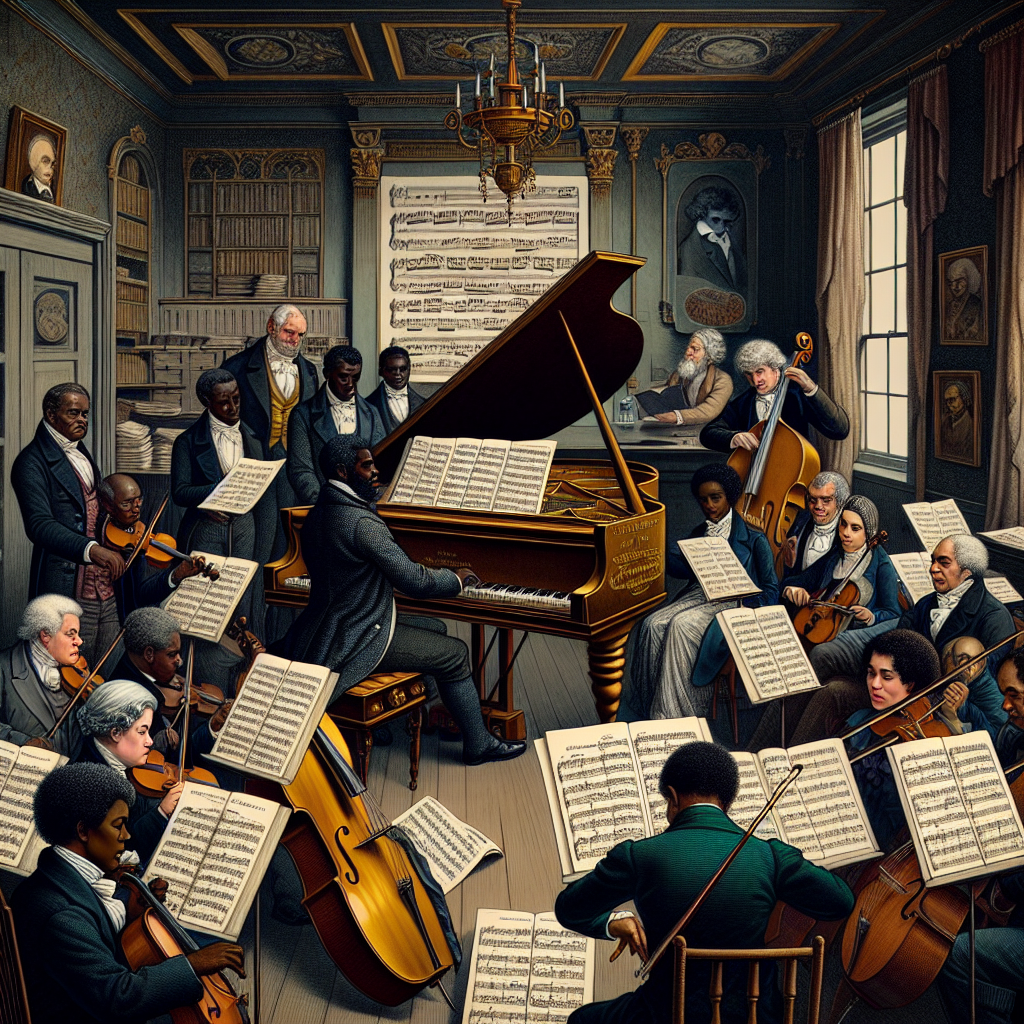
How Beethoven Inspired Generations of African American Musicians
Ludwig van Beethoven, one of the most acclaimed composers in Western music history, has left an indelible mark that transcends generations, cultures, and geographic locations. Although Beethoven lived in the late 18th and early 19th centuries, his music and life story inspire people from all walks of life, including African American musicians. Understanding his global influence particularly highlights the power of music to bridge diverse cultural boundaries. This article aims to delve into the ways Beethoven has inspired African American musicians over the years, demonstrating the deep, universal resonance his work has achieved.
Born in Bonn, Germany, in 1770, Beethoven showed early talent and ambition in music. He shifted to Vienna, where he spent the majority of his career crafting compositions that redefined the music landscape. His symphonies, especially the iconic Symphony No. 9, Symphony No. 5, and the Moonlight Sonata, have continued to be celebrated worldwide. However, it’s his ability to imbue his music with profound emotional depth and his narrative of overcoming adversity, particularly his struggle with deafness, that has deeply connected with African American musicians throughout history.
African American musicians have faced a unique set of challenges due to systemic racism and exclusion from mainstream music venues historically dominated by white musicians. Despite this, many have found kinship in Beethoven’s music, viewing him as an archetype of resilience and artistic genius. They have been inspired by his stories of perseverance and used his compositions as a foundation to explore new musical frontiers, fostering a bond that transcends racial and cultural divides.
Beethoven and The Harlem Renaissance
The Harlem Renaissance, spanned the 1920s and 1930s, was a profound cultural movement where African American artists, musicians, and writers sought to redefine their identity and reclaim their cultural heritage. During this period, Beethoven’s influence became particularly noticeable. His compositions provided a classical framework from which artists could derive inspiration while simultaneously forging a new path that would define African American art.
Pioneering African American musicians like Duke Ellington and William Grant Still often cited Beethoven as an influence. Ellington, a key figure in the Harlem Renaissance, was known for his innovative compositions that integrated elements of jazz and classical music. Through incorporating structures reminiscent of Beethoven’s symphonies, Ellington created a unique sound that celebrated African American culture while paying homage to European classical traditions.
William Grant Still, another towering figure of the Harlem Renaissance, often referred to as the “Dean of African American composers,” drew heavily from Beethoven’s monumental symphonic works. He sought to show that just as Beethoven had transcended his personal struggles to create beautiful music, African American musicians could rise above racial barriers and showcase their talents on the world stage. Still’s Afro-American Symphony, for instance, made a significant impact, exemplifying how the integration of African American musical forms within the context of a classical symphony could create a poignant, powerful new art form.

Impact on Jazz and Blues
Beyond the boundaries of classical music, Beethoven’s influence reached into the realms of jazz and blues—genres often considered the heart of African American musical expression. The improvisational nature of jazz aligns well with Beethoven’s somewhat revolutionary approach to composition, where he often broke traditional rules to explore new and profound emotional depths.
Great jazz artists like John Coltrane and Miles Davis were known to incorporate elements of classical music, including Beethoven, into their works. Coltrane’s deeply spiritual and complex compositions echo Beethoven’s emotional expressiveness. In live performances and recorded tracks, these elements created layered, impactful pieces of music that resonated with diverse audiences.
Similarly, the blues—an essential precursor to jazz—found resonance in the sentiments of struggle and resilience evident in Beethoven’s compositions. Blues musicians such as Robert Johnson and later B.B. King often encapsulated the deep-seated emotional struggles of African American life in America. The universality of Beethoven’s theme of overcoming personal adversity resonated deeply within their narratives, demonstrating a shared human experience regardless of time and place.
Influence on Gospel and R&B
Beethoven’s influence extended beyond secular music and permeated gospel and R&B, key genres within African American communities. Gospel music, characterized by its profound emotional delivery and spiritual messages, shares a kindred spirit with Beethoven’s deeply moving symphonies and sonatas.
Iconic gospel singers like Mahalia Jackson and Thomas A. Dorsey admired Beethoven’s ability to communicate profound emotion through music. These gospel artists, known for their powerful and emotive performances, often sourced inspiration from Beethoven’s musical narratives of joy, sorrow, and redemption.
Meanwhile, in the realm of R&B, artists such as Ray Charles and Aretha Franklin showed traces of classical music influences in their arrangements and compositions. Beethoven’s emotive power and structural innovations found echoes in their music, enabling them to reach vast audiences and express themes of love, pain, and triumph. This intertwining of classical elements within modern genres highlighted Beethoven’s far-reaching influence and the timeless nature of his work.
Educational Outreach and Beethoven
Beethoven’s story of overcoming profound personal challenge, particularly his battle with deafness, has been a source of inspiration in educational contexts, particularly for African American musicians. Music education programs often include Beethoven as a case study to inspire young musicians to achieve excellence despite facing systemic and personal hardships.
Organizations like the Sphinx Organization, which aims to address the underrepresentation of people of color in classical music, often highlight Beethoven’s music in their curriculum. They use Beethoven’s compositions as a pedagogical tool to teach fundamental principles of music while also illustrating narratives of resilience and perseverance that resonate with the lived experiences of many African American students.
Furthermore, jazz appreciation courses and music theory classes frequently integrate Beethoven studies to show the interconnectedness of various musical traditions and demonstrate how classical foundations can inform modern musical trends. This educational use of Beethoven’s work continues to inspire a new generation of African American musicians, helping them to see the relevance of his legacy in contemporary music and their personal musical journeys.
Beethoven in Modern African American Music
In modern times, Beethoven’s influence can be seen within the works of contemporary African American artists who continue to push the boundaries of musical innovation. Whether explicitly or subtly, the essence of Beethoven’s compositions and his tales of perseverance manifest in their creative output.
Musical icons like Alicia Keys have spoken about the impact of classical music training on their development as artists. Keys, a classically trained pianist, often cites Beethoven as a significant influence. Her ability to blend classical virtuosic elements with contemporary pop and R&B nuances showcases how Beethoven’s legacy continues to unfold in modern music.
Similarly, artists like Kendrick Lamar, who explore deep social and personal themes in their music, exemplify Beethoven’s spirit of using art to address societal issues and explore the human condition. Beethoven’s music, transcending basic entertainment, often served as a commentary on the broader human experience—a principle that finds strong parallels in Lamar’s socially conscious lyrics and innovative compositional techniques.
Conclusion
The influence of Ludwig van Beethoven on African American musicians throughout history underscores the universal language of music. Beethoven’s life, characterized by artistic triumph against hardship, and his timeless compositions have resonated deeply across cultures and genres. From the Harlem Renaissance to modern-day musical expressions, African American musicians have drawn inspiration from Beethoven’s work, integrating it into the fabric of their unique cultural narratives and contributing to a rich, evolving tapestry of musical expression.
By transcending racial and cultural barriers, Beethoven’s legacy serves as a powerful testament to music’s ability to unite and inspire. His influence on African American musicians is a shining example of this universal connectivity, demonstrating how shared human experiences can foster appreciation and admiration across diverse musical landscapes. Beethoven’s ethos of perseverance, coupled with his innovative genius, continues to inspire generations of musicians, proving that great art knows no bounds.
The continuing relevance of Beethoven in the world of African American music underscores the enduring power of his compositions to speak to both individual and collective experiences of struggle, joy, and ultimate triumph. In celebrating the musical giants who have drawn from Beethoven’s legacy, we also honor the enduring impact of his extraordinary artistic contributions to the world.